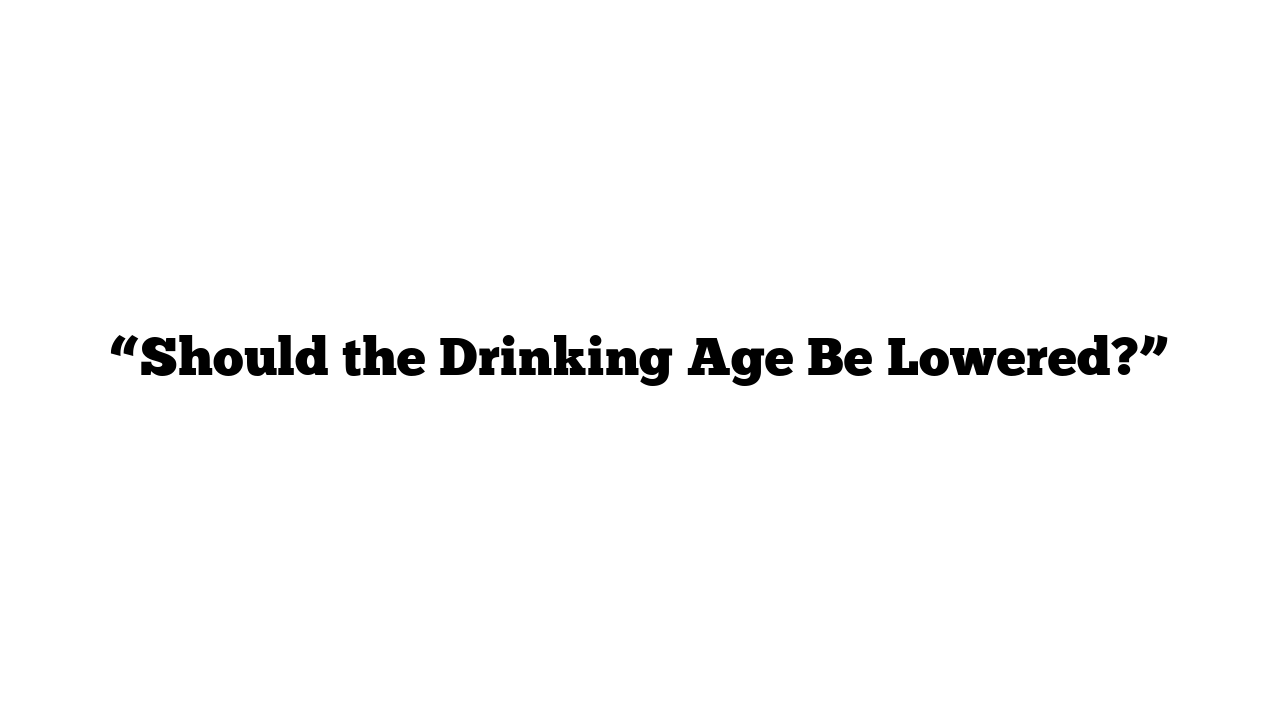The debate over whether the drinking age should be lowered has been a hot topic for years. In the United States, the minimum legal drinking age (MLDA) is 21, one of the highest in the world. Advocates and opponents each present compelling arguments, from public safety concerns to personal freedom and cultural norms. This article explores the various aspects of this debate to provide a balanced perspective.
Understanding the Current Drinking Age Law in the USA
The legal drinking age in the USA was set at 21 in 1984 through the National Minimum Drinking Age Act. States that failed to comply faced a reduction in federal highway funds, effectively unifying the drinking age across the country.
Proponents of the law argue that it has:
- Reduced drunk driving incidents.
- Prevented underage alcohol abuse.
However, critics believe it infringes on individual rights and argue that other countries with lower drinking ages do not face worse outcomes.
Arguments for Lowering the Drinking Age
1. Promotes Responsible Drinking
Supporters argue that lowering the drinking age to 18 could encourage responsible alcohol use by integrating drinking into supervised settings, such as family dinners or regulated events.
2. Aligns with Other Adult Rights
At 18, individuals in the USA can:
- Vote in elections.
- Join the military.
- Sign contracts.
Advocates question why they cannot legally purchase alcohol when they are entrusted with other significant responsibilities.
3. Reduces Underage Binge Drinking
The current law is said to push underage drinking into unsupervised and risky settings. Lowering the drinking age might bring drinking into safer, more controlled environments.
4. International Comparisons
Countries like Germany and Australia, where the drinking age is lower, do not report significantly higher rates of alcohol-related issues. Proponents argue the USA could adopt similar policies with success.
Arguments Against Lowering the Drinking Age
1. Protects Brain Development
Medical research shows that the brain continues to develop until the mid-20s. Drinking alcohol at a younger age may harm cognitive development and increase the risk of addiction.
2. Reduces Alcohol-Related Accidents
The higher drinking age has been associated with a decline in drunk driving incidents. Lowering the age could reverse this trend, putting lives at risk.
3. Prevents Early Alcohol Dependence
Delaying the legal drinking age can reduce the likelihood of developing an alcohol dependence later in life.
4. Public Health Costs
Increased underage drinking could lead to higher rates of alcohol-related health problems, placing a burden on the healthcare system.
Middle Ground Solutions
1. Drinking Licenses
Some propose issuing licenses to young adults who complete an alcohol education program, ensuring they understand the risks and responsibilities of drinking.
2. Conditional Lowering
Another suggestion is lowering the age to 18 only for beer and wine while keeping spirits restricted until 21.
3. Stronger Education Programs
Investing in alcohol education for high school and college students could teach responsible consumption without changing the law.
Global Perspectives
In many countries, the legal drinking age is below 21:
- Germany: 16 for beer and wine, 18 for spirits.
- Australia: 18 for all alcoholic beverages.
- France: 18 for all alcoholic beverages.
Despite the differences, cultural attitudes toward drinking in these nations emphasize moderation and responsibility, reducing alcohol-related harm.
What Does the Data Say?
Research from the National Institute on Alcohol Abuse and Alcoholism (NIAAA) shows:
- States that adopted the 21-year-old drinking age experienced a 16% reduction in traffic fatalities.
- Early exposure to alcohol is linked to a higher risk of addiction later in life.
While these findings support keeping the MLDA at 21, proponents of lowering it argue that these issues could be mitigated with proper education and regulations.
Visit “medicaltimes.io” for More Insights
For more expert tips, explanations, and deeper insights into public health topics, visit medicaltimes.io.
Top 10 FAQs About Lowering the Drinking Age
1. Why is the drinking age 21 in the USA?
The National Minimum Drinking Age Act of 1984 standardized it to reduce drunk driving incidents.
2. Do countries with a lower drinking age have more alcohol problems?
Not necessarily. Countries like Germany and France report lower rates of binge drinking among young people.
3. How does alcohol affect brain development?
Drinking before the brain fully develops (around age 25) can harm memory, decision-making, and impulse control.
4. Would lowering the drinking age reduce binge drinking?
It might, as young adults could drink in safer, supervised environments.
5. Are drunk driving rates higher in countries with a lower drinking age?
Not always. Cultural attitudes toward drinking play a significant role.
6. What age do most countries set for drinking?
Most countries have a legal drinking age of 18.
7. Can 18-year-olds drink in the military?
Military members often have exceptions to the drinking age, depending on location and circumstances.
8. What is a drinking license?
A proposed system where individuals complete education programs to earn the right to drink legally.
9. Is the USA the only country with a drinking age of 21?
No, but it’s one of the few developed nations with such a high minimum age.
10. Why is this topic so controversial?
It involves balancing public safety, individual freedom, and cultural norms, making it a complex issue.
